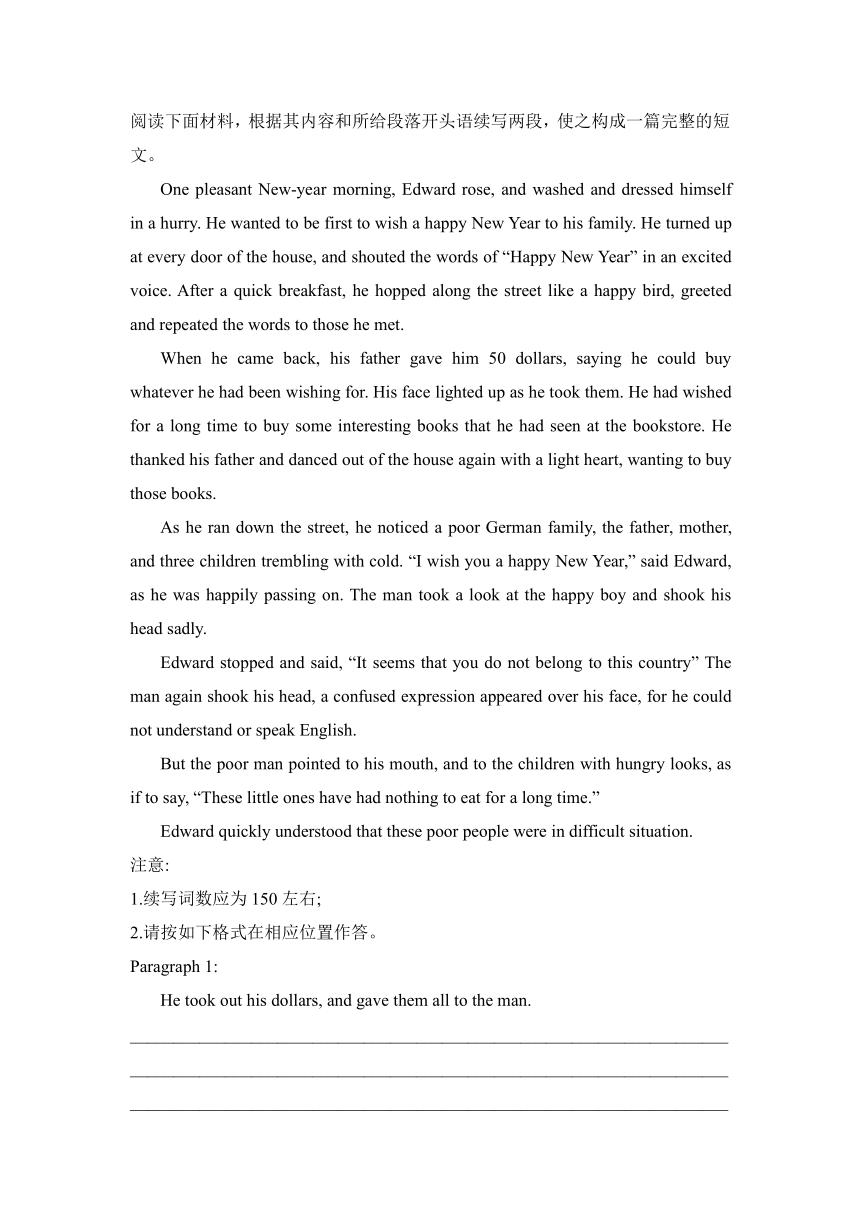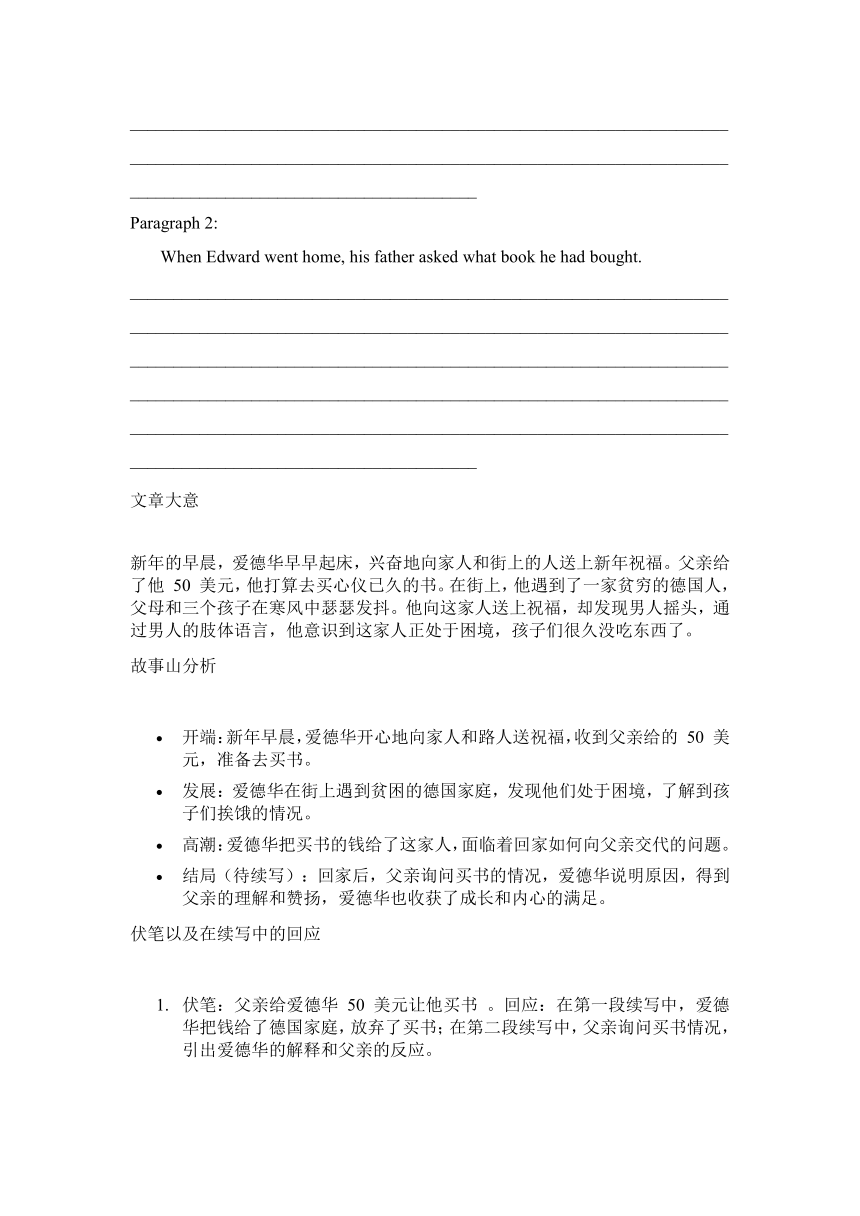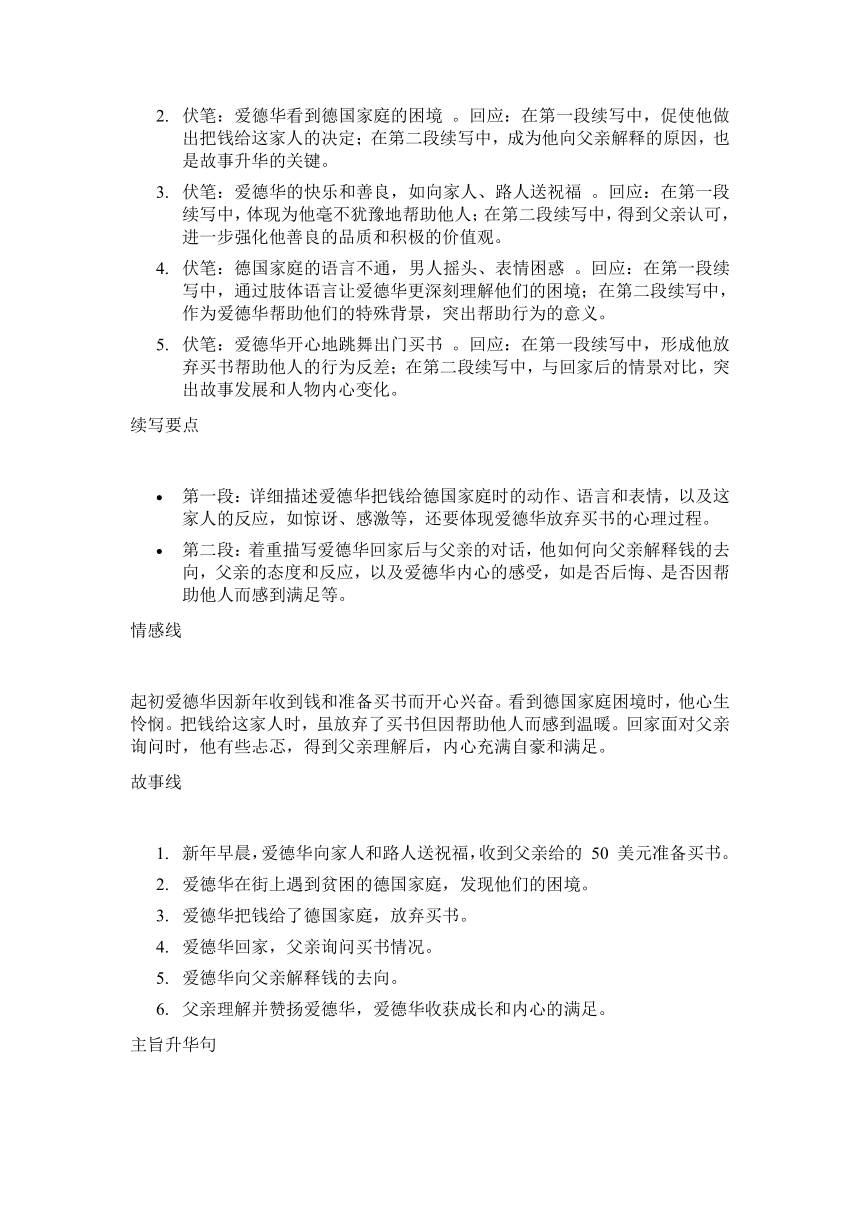读后续写--新年里的暖心转变:从买书梦到爱心传递 讲义-宁夏西夏区2023-2024学年高一上学期1月期末英语试题
文档属性
| 名称 | 读后续写--新年里的暖心转变:从买书梦到爱心传递 讲义-宁夏西夏区2023-2024学年高一上学期1月期末英语试题 |

|
|
| 格式 | docx | ||
| 文件大小 | 24.0KB | ||
| 资源类型 | 教案 | ||
| 版本资源 | 人教版(2019) | ||
| 科目 | 英语 | ||
| 更新时间 | 2025-02-06 21:46:03 | ||
图片预览



文档简介
阅读下面材料,根据其内容和所给段落开头语续写两段,使之构成一篇完整的短文。
One pleasant New-year morning, Edward rose, and washed and dressed himself in a hurry. He wanted to be first to wish a happy New Year to his family. He turned up at every door of the house, and shouted the words of “Happy New Year” in an excited voice. After a quick breakfast, he hopped along the street like a happy bird, greeted and repeated the words to those he met.
When he came back, his father gave him 50 dollars, saying he could buy whatever he had been wishing for. His face lighted up as he took them. He had wished for a long time to buy some interesting books that he had seen at the bookstore. He thanked his father and danced out of the house again with a light heart, wanting to buy those books.
As he ran down the street, he noticed a poor German family, the father, mother, and three children trembling with cold. “I wish you a happy New Year,” said Edward, as he was happily passing on. The man took a look at the happy boy and shook his head sadly.
Edward stopped and said, “It seems that you do not belong to this country” The man again shook his head, a confused expression appeared over his face, for he could not understand or speak English.
But the poor man pointed to his mouth, and to the children with hungry looks, as if to say, “These little ones have had nothing to eat for a long time.”
Edward quickly understood that these poor people were in difficult situation.
注意:
1.续写词数应为150左右;
2.请按如下格式在相应位置作答。
Paragraph 1:
He took out his dollars, and gave them all to the man.
_________________________________________________________________________________________________________________________________________________________________________________________________________________________________________________________________________________________________________________________________________________________________________________________________
Paragraph 2:
When Edward went home, his father asked what book he had bought.
_________________________________________________________________________________________________________________________________________________________________________________________________________________________________________________________________________________________________________________________________________________________________________________________________
文章大意
新年的早晨,爱德华早早起床,兴奋地向家人和街上的人送上新年祝福。父亲给了他 50 美元,他打算去买心仪已久的书。在街上,他遇到了一家贫穷的德国人,父母和三个孩子在寒风中瑟瑟发抖。他向这家人送上祝福,却发现男人摇头,通过男人的肢体语言,他意识到这家人正处于困境,孩子们很久没吃东西了。
故事山分析
开端:新年早晨,爱德华开心地向家人和路人送祝福,收到父亲给的 50 美元,准备去买书。
发展:爱德华在街上遇到贫困的德国家庭,发现他们处于困境,了解到孩子们挨饿的情况。
高潮:爱德华把买书的钱给了这家人,面临着回家如何向父亲交代的问题。
结局(待续写):回家后,父亲询问买书的情况,爱德华说明原因,得到父亲的理解和赞扬,爱德华也收获了成长和内心的满足。
伏笔以及在续写中的回应
伏笔:父亲给爱德华 50 美元让他买书 。回应:在第一段续写中,爱德华把钱给了德国家庭,放弃了买书;在第二段续写中,父亲询问买书情况,引出爱德华的解释和父亲的反应。
伏笔:爱德华看到德国家庭的困境 。回应:在第一段续写中,促使他做出把钱给这家人的决定;在第二段续写中,成为他向父亲解释的原因,也是故事升华的关键。
伏笔:爱德华的快乐和善良,如向家人、路人送祝福 。回应:在第一段续写中,体现为他毫不犹豫地帮助他人;在第二段续写中,得到父亲认可,进一步强化他善良的品质和积极的价值观。
伏笔:德国家庭的语言不通,男人摇头、表情困惑 。回应:在第一段续写中,通过肢体语言让爱德华更深刻理解他们的困境;在第二段续写中,作为爱德华帮助他们的特殊背景,突出帮助行为的意义。
伏笔:爱德华开心地跳舞出门买书 。回应:在第一段续写中,形成他放弃买书帮助他人的行为反差;在第二段续写中,与回家后的情景对比,突出故事发展和人物内心变化。
续写要点
第一段:详细描述爱德华把钱给德国家庭时的动作、语言和表情,以及这家人的反应,如惊讶、感激等,还要体现爱德华放弃买书的心理过程。
第二段:着重描写爱德华回家后与父亲的对话,他如何向父亲解释钱的去向,父亲的态度和反应,以及爱德华内心的感受,如是否后悔、是否因帮助他人而感到满足等。
情感线
起初爱德华因新年收到钱和准备买书而开心兴奋。看到德国家庭困境时,他心生怜悯。把钱给这家人时,虽放弃了买书但因帮助他人而感到温暖。回家面对父亲询问时,他有些忐忑,得到父亲理解后,内心充满自豪和满足。
故事线
新年早晨,爱德华向家人和路人送祝福,收到父亲给的 50 美元准备买书。
爱德华在街上遇到贫困的德国家庭,发现他们的困境。
爱德华把钱给了德国家庭,放弃买书。
爱德华回家,父亲询问买书情况。
爱德华向父亲解释钱的去向。
父亲理解并赞扬爱德华,爱德华收获成长和内心的满足。
主旨升华句
This act of kindness not only brought warmth to the poor family but also taught Edward the true meaning of happiness, which lies in giving rather than receiving.(这次善举不仅给贫困家庭带来了温暖,也让爱德华懂得了幸福的真正含义在于给予而非索取。)
Through this experience, Edward realized that a small act of compassion can have a profound impact on others' lives, and the value of empathy and generosity far outweighs material possessions.(通过这次经历,爱德华意识到一个小小的同情之举可以对他人的生活产生深远影响,同理心和慷慨的价值远远超过物质财富。)
Edward's choice to help the German family instead of buying books showed that in the face of others' suffering, true kindness prevails over personal desires, and such selfless acts can create a more harmonious and loving world.(爱德华选择帮助德国家庭而不是买书,表明在他人受苦时,真正的善良战胜了个人欲望,这种无私的行为可以创造一个更和谐、更有爱的世界。)
As Edward received his father's praise for his kindness, he understood that the greatest wealth in life is not money or possessions but the ability to bring joy and hope to those in need.(当爱德华因善良得到父亲的赞扬时,他明白了人生最大的财富不是金钱或财产,而是给有需要的人带来快乐和希望的能力。)
This New - Year's story of Edward serves as a reminder that in the pursuit of our own dreams, we should always keep an eye on the needs of others, for it is in helping others that we truly grow and find the essence of life.(爱德华的这个新年故事提醒我们,在追求自己梦想的过程中,我们应该时刻关注他人的需求,因为正是在帮助他人的过程中,我们真正成长并找到了生命的真谛。)
写作示范一
第一段
He took out his dollars, and gave them all to the man. With a determined look on his face, Edward placed the money gently into the man's hand. “Take this. It will help you buy some food for your family,” he said softly. The man's eyes widened in disbelief, and then filled with gratitude. His lips trembled as if he wanted to say something but couldn't find the words. The children, too, looked at Edward with big, round eyes, a glimmer of hope shining in them. Edward smiled at them, feeling a warmth in his heart despite giving away all his money.
第二段
When Edward went home, his father asked what book he had bought. Edward lowered his head for a moment, a bit nervous. Then he looked up, met his father's eyes, and told him the whole story. “I'm sorry, Dad. I didn't buy the books, but I couldn't bear to see them hungry,” he said. His father smiled warmly and patted him on the shoulder. “You've made the right choice, son. Your kindness is more precious than any book.” Edward felt a surge of pride and happiness. He realized that helping others brought him a joy that no book could ever replace.
写作示范二
第一段
He took out his dollars, and gave them all to the man. Without hesitation, Edward thrust the money into the man's cold hands. “Here, this is for you and your family,” he exclaimed. The man was stunned, his face a mix of shock and gratitude. He bowed deeply, while the children gathered around, their thin faces lighting up with a faint smile. Edward felt a strange sense of contentment, even though his dream of buying books had vanished. He knew in his heart that he had done something far more important.
第二段
When Edward went home, his father asked what book he had bought. Edward took a deep breath and told his father everything that had happened. His father listened attentively, a proud look gradually appearing on his face. “Son, you've shown great compassion today. The books can wait, but the help you gave to that family is priceless.” Edward smiled, his heart full. He understood that true happiness came from making a difference in others' lives, and he couldn't wait to spread more kindness in the future.
【答案】Paragraph 1:
He took out his dollars, and gave them all to the man. How their eyes sparkled with gratitude! They said something in their language, which might mean, “You are doing me a great favor, and I am very grateful to you.” The man was so moved that he stood there, failing to say any words. At the same time, Edward saw a bright smile spread across the man’s face. He smiled back at the father, waved goodbye to the family and went home delightedly.
Paragraph 2:
When Edward went home, his father asked what book he had bought. He hung his head a moment, but quickly looked up. Then he told the story to his father. “I have bought no books,” said he, “I can wait for my books till next New Year.” “My dear boy,” said his father, “here are a dozen of books. I give them to you, more as a reward for your goodness of heart than as a New Year gift.” It was on that very moment that Edward realized a small act of kindness may be powerful enough to make a huge difference.
One pleasant New-year morning, Edward rose, and washed and dressed himself in a hurry. He wanted to be first to wish a happy New Year to his family. He turned up at every door of the house, and shouted the words of “Happy New Year” in an excited voice. After a quick breakfast, he hopped along the street like a happy bird, greeted and repeated the words to those he met.
When he came back, his father gave him 50 dollars, saying he could buy whatever he had been wishing for. His face lighted up as he took them. He had wished for a long time to buy some interesting books that he had seen at the bookstore. He thanked his father and danced out of the house again with a light heart, wanting to buy those books.
As he ran down the street, he noticed a poor German family, the father, mother, and three children trembling with cold. “I wish you a happy New Year,” said Edward, as he was happily passing on. The man took a look at the happy boy and shook his head sadly.
Edward stopped and said, “It seems that you do not belong to this country” The man again shook his head, a confused expression appeared over his face, for he could not understand or speak English.
But the poor man pointed to his mouth, and to the children with hungry looks, as if to say, “These little ones have had nothing to eat for a long time.”
Edward quickly understood that these poor people were in difficult situation.
注意:
1.续写词数应为150左右;
2.请按如下格式在相应位置作答。
Paragraph 1:
He took out his dollars, and gave them all to the man.
_________________________________________________________________________________________________________________________________________________________________________________________________________________________________________________________________________________________________________________________________________________________________________________________________
Paragraph 2:
When Edward went home, his father asked what book he had bought.
_________________________________________________________________________________________________________________________________________________________________________________________________________________________________________________________________________________________________________________________________________________________________________________________________
文章大意
新年的早晨,爱德华早早起床,兴奋地向家人和街上的人送上新年祝福。父亲给了他 50 美元,他打算去买心仪已久的书。在街上,他遇到了一家贫穷的德国人,父母和三个孩子在寒风中瑟瑟发抖。他向这家人送上祝福,却发现男人摇头,通过男人的肢体语言,他意识到这家人正处于困境,孩子们很久没吃东西了。
故事山分析
开端:新年早晨,爱德华开心地向家人和路人送祝福,收到父亲给的 50 美元,准备去买书。
发展:爱德华在街上遇到贫困的德国家庭,发现他们处于困境,了解到孩子们挨饿的情况。
高潮:爱德华把买书的钱给了这家人,面临着回家如何向父亲交代的问题。
结局(待续写):回家后,父亲询问买书的情况,爱德华说明原因,得到父亲的理解和赞扬,爱德华也收获了成长和内心的满足。
伏笔以及在续写中的回应
伏笔:父亲给爱德华 50 美元让他买书 。回应:在第一段续写中,爱德华把钱给了德国家庭,放弃了买书;在第二段续写中,父亲询问买书情况,引出爱德华的解释和父亲的反应。
伏笔:爱德华看到德国家庭的困境 。回应:在第一段续写中,促使他做出把钱给这家人的决定;在第二段续写中,成为他向父亲解释的原因,也是故事升华的关键。
伏笔:爱德华的快乐和善良,如向家人、路人送祝福 。回应:在第一段续写中,体现为他毫不犹豫地帮助他人;在第二段续写中,得到父亲认可,进一步强化他善良的品质和积极的价值观。
伏笔:德国家庭的语言不通,男人摇头、表情困惑 。回应:在第一段续写中,通过肢体语言让爱德华更深刻理解他们的困境;在第二段续写中,作为爱德华帮助他们的特殊背景,突出帮助行为的意义。
伏笔:爱德华开心地跳舞出门买书 。回应:在第一段续写中,形成他放弃买书帮助他人的行为反差;在第二段续写中,与回家后的情景对比,突出故事发展和人物内心变化。
续写要点
第一段:详细描述爱德华把钱给德国家庭时的动作、语言和表情,以及这家人的反应,如惊讶、感激等,还要体现爱德华放弃买书的心理过程。
第二段:着重描写爱德华回家后与父亲的对话,他如何向父亲解释钱的去向,父亲的态度和反应,以及爱德华内心的感受,如是否后悔、是否因帮助他人而感到满足等。
情感线
起初爱德华因新年收到钱和准备买书而开心兴奋。看到德国家庭困境时,他心生怜悯。把钱给这家人时,虽放弃了买书但因帮助他人而感到温暖。回家面对父亲询问时,他有些忐忑,得到父亲理解后,内心充满自豪和满足。
故事线
新年早晨,爱德华向家人和路人送祝福,收到父亲给的 50 美元准备买书。
爱德华在街上遇到贫困的德国家庭,发现他们的困境。
爱德华把钱给了德国家庭,放弃买书。
爱德华回家,父亲询问买书情况。
爱德华向父亲解释钱的去向。
父亲理解并赞扬爱德华,爱德华收获成长和内心的满足。
主旨升华句
This act of kindness not only brought warmth to the poor family but also taught Edward the true meaning of happiness, which lies in giving rather than receiving.(这次善举不仅给贫困家庭带来了温暖,也让爱德华懂得了幸福的真正含义在于给予而非索取。)
Through this experience, Edward realized that a small act of compassion can have a profound impact on others' lives, and the value of empathy and generosity far outweighs material possessions.(通过这次经历,爱德华意识到一个小小的同情之举可以对他人的生活产生深远影响,同理心和慷慨的价值远远超过物质财富。)
Edward's choice to help the German family instead of buying books showed that in the face of others' suffering, true kindness prevails over personal desires, and such selfless acts can create a more harmonious and loving world.(爱德华选择帮助德国家庭而不是买书,表明在他人受苦时,真正的善良战胜了个人欲望,这种无私的行为可以创造一个更和谐、更有爱的世界。)
As Edward received his father's praise for his kindness, he understood that the greatest wealth in life is not money or possessions but the ability to bring joy and hope to those in need.(当爱德华因善良得到父亲的赞扬时,他明白了人生最大的财富不是金钱或财产,而是给有需要的人带来快乐和希望的能力。)
This New - Year's story of Edward serves as a reminder that in the pursuit of our own dreams, we should always keep an eye on the needs of others, for it is in helping others that we truly grow and find the essence of life.(爱德华的这个新年故事提醒我们,在追求自己梦想的过程中,我们应该时刻关注他人的需求,因为正是在帮助他人的过程中,我们真正成长并找到了生命的真谛。)
写作示范一
第一段
He took out his dollars, and gave them all to the man. With a determined look on his face, Edward placed the money gently into the man's hand. “Take this. It will help you buy some food for your family,” he said softly. The man's eyes widened in disbelief, and then filled with gratitude. His lips trembled as if he wanted to say something but couldn't find the words. The children, too, looked at Edward with big, round eyes, a glimmer of hope shining in them. Edward smiled at them, feeling a warmth in his heart despite giving away all his money.
第二段
When Edward went home, his father asked what book he had bought. Edward lowered his head for a moment, a bit nervous. Then he looked up, met his father's eyes, and told him the whole story. “I'm sorry, Dad. I didn't buy the books, but I couldn't bear to see them hungry,” he said. His father smiled warmly and patted him on the shoulder. “You've made the right choice, son. Your kindness is more precious than any book.” Edward felt a surge of pride and happiness. He realized that helping others brought him a joy that no book could ever replace.
写作示范二
第一段
He took out his dollars, and gave them all to the man. Without hesitation, Edward thrust the money into the man's cold hands. “Here, this is for you and your family,” he exclaimed. The man was stunned, his face a mix of shock and gratitude. He bowed deeply, while the children gathered around, their thin faces lighting up with a faint smile. Edward felt a strange sense of contentment, even though his dream of buying books had vanished. He knew in his heart that he had done something far more important.
第二段
When Edward went home, his father asked what book he had bought. Edward took a deep breath and told his father everything that had happened. His father listened attentively, a proud look gradually appearing on his face. “Son, you've shown great compassion today. The books can wait, but the help you gave to that family is priceless.” Edward smiled, his heart full. He understood that true happiness came from making a difference in others' lives, and he couldn't wait to spread more kindness in the future.
【答案】Paragraph 1:
He took out his dollars, and gave them all to the man. How their eyes sparkled with gratitude! They said something in their language, which might mean, “You are doing me a great favor, and I am very grateful to you.” The man was so moved that he stood there, failing to say any words. At the same time, Edward saw a bright smile spread across the man’s face. He smiled back at the father, waved goodbye to the family and went home delightedly.
Paragraph 2:
When Edward went home, his father asked what book he had bought. He hung his head a moment, but quickly looked up. Then he told the story to his father. “I have bought no books,” said he, “I can wait for my books till next New Year.” “My dear boy,” said his father, “here are a dozen of books. I give them to you, more as a reward for your goodness of heart than as a New Year gift.” It was on that very moment that Edward realized a small act of kindness may be powerful enough to make a huge difference.
同课章节目录
